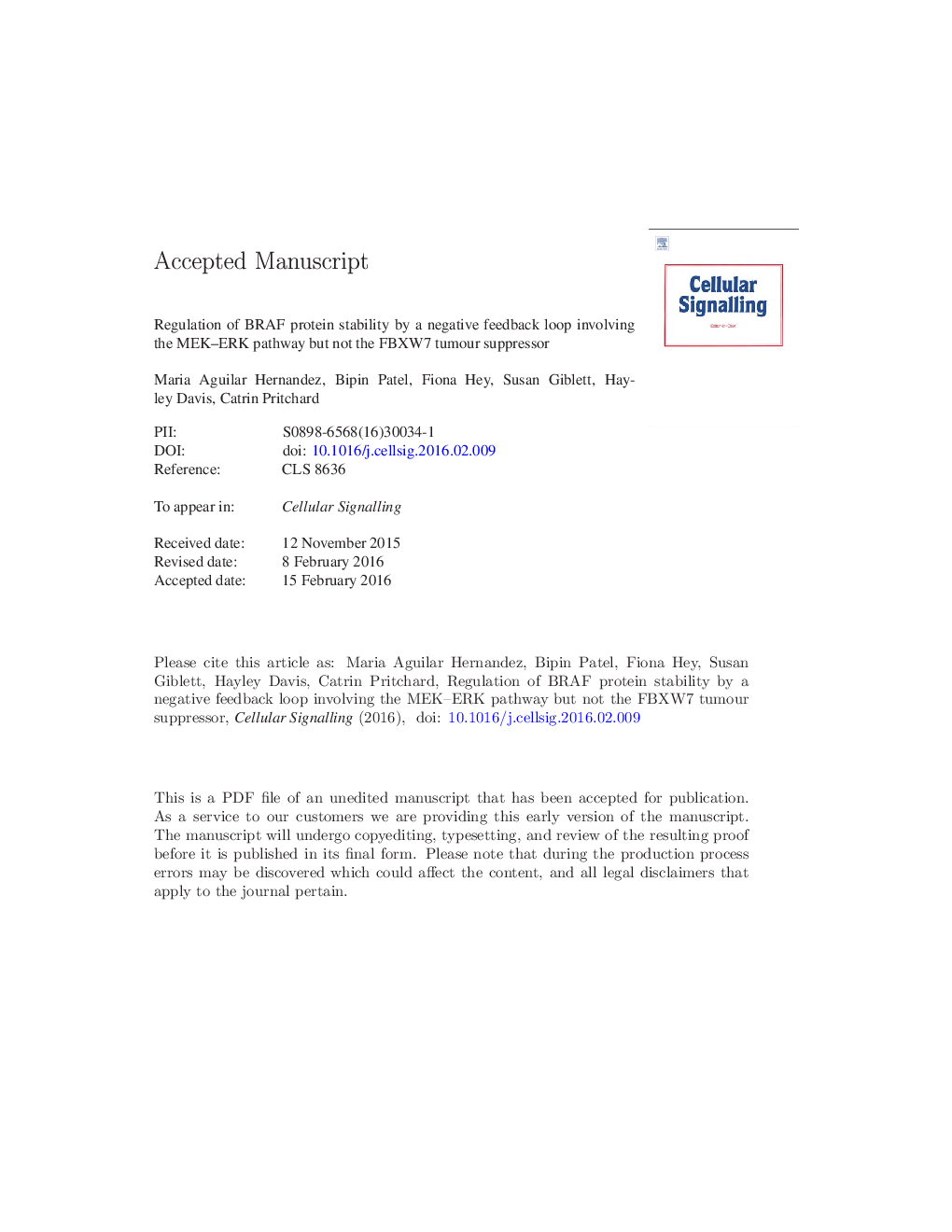| کد مقاله | کد نشریه | سال انتشار | مقاله انگلیسی | نسخه تمام متن |
|---|---|---|---|---|
| 10815129 | 1058451 | 2016 | 33 صفحه PDF | دانلود رایگان |
عنوان انگلیسی مقاله ISI
Regulation of BRAF protein stability by a negative feedback loop involving the MEK-ERK pathway but not the FBXW7 tumour suppressor
دانلود مقاله + سفارش ترجمه
دانلود مقاله ISI انگلیسی
رایگان برای ایرانیان
کلمات کلیدی
GLBDMEMGFPFbxw7C. elegansERKBRAFSCFMEFscpd - CPDDMSO - DMSODulbecco's modified Eagle's medium - Medal of Eagle اصلاح شده DulbeccoFeedback - بازخوردdimethylsulphoxide - دی متیل سولفوکسیدMEK - مجاهدین خلقmouse embryonic fibroblasts - موش فیبروبلاست جنینیProtein stability - پایداری پروتئینgreen fluorescent protein - پروتئین فلورسنت سبزmitogen-activated protein kinase kinase - پروتئین کیناز کیناز فعال Mitogen فعالCaenorhabditis elegans - کرم الگانس extracellular signal-regulated kinase - کیناز تنظیم شده سیگنال خارج سلولی
موضوعات مرتبط
علوم زیستی و بیوفناوری
بیوشیمی، ژنتیک و زیست شناسی مولکولی
زیست شیمی
پیش نمایش صفحه اول مقاله

چکیده انگلیسی
The V600EBRAF oncogenic mutation is detected in a wide range of human cancers and induces hyperactivation of the downstream MEK-ERK signalling cascade. Although output of the BRAF-MEK-ERK pathway is regulated by feed-forward RAF activity, feedback control also plays an important role. One such feedback pathway has been identified in Caenorhabditis elegans and involves ERK-mediated phosphorylation of BRAF within a CDC4 phosphodegron (CPD), targeting BRAF for degradation via CDC4 (also known as FBXW7), a component of the SKP1/CUL1/F-box (SCF) E3 ubiquitin ligase complex. Here we investigate this pathway in mammalian cells. Short-term expression of autochthonous V600EBRAF in mouse embryonic fibroblasts (MEFs) leads to down-regulation of BRAF protein levels in a proteasome-dependent manner and V600EBRAF has a reduced half-life compared to WTBRAF in HEK293T cells. These effects were reversed by treatment with the MEK inhibitor PD184352. We have identified the equivalent CPD at residues 400-405 in human BRAF and have found that mutation of ERK phosphorylation sites at residues T401 and S405 in V600EBRAF increases the half-life of the protein. While BRAF and FBXW7 co-immunoprecipitated, the overexpression of FBXW7 did not influence the half-life of either WTBRAF or V600EBRAF. Furthermore, disruption of the substrate-binding site of mouse FBXW7 using the R482Q mutation did not affect the interaction with BRAF and the expression levels of WTBRAF and V600EBRAF were not altered in MEFs derived from mice with the homozygous knockin R482QFBXW7 mutation. Overall these data confirm the existence of a negative feedback pathway by which BRAF protein stability is regulated by ERK. However, unlike the situation in C. elegans, FBXW7 does not play a unique role in mediating subsequent BRAF degradation.
ناشر
Database: Elsevier - ScienceDirect (ساینس دایرکت)
Journal: Cellular Signalling - Volume 28, Issue 6, June 2016, Pages 561-571
Journal: Cellular Signalling - Volume 28, Issue 6, June 2016, Pages 561-571
نویسندگان
Maria Aguilar Hernandez, Bipin Patel, Fiona Hey, Susan Giblett, Hayley Davis, Catrin Pritchard,